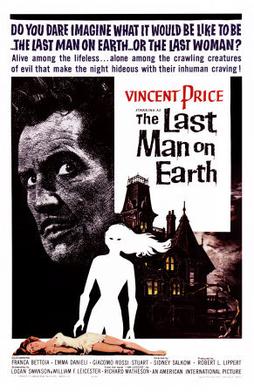The
Last Man on Earth (1964)
Directed by Ubaldo Ragona and
Sidney Salkow
Screenplay by Ubaldo Ragona, William
Leicester, Furio M. Monetti, and Richard Matheson, based on the novel I Am Legend by Matheson
Runtime: 1 hr, 27 min
If
you will recall, last year was a pretty big time for end of the world hysteria,
what with the Mayan calendar and all.
But, as I like to say, we’ve been thinking about the end of the world
since the beginning of it, so it should be no surprise that there have been a
ton of movies on that subject. Despite
that, I’ve not seen too many films in that vein. I guess the topic has never interested me
that much. That said, the little
description of The Last Man on Earth
found on TCM’s website was all that was needed to entice me into watching.
The
picture opens in December 1968, three years after a killer bacteria wiped out
all of humanity. All, it seems, except
for one man: Dr. Robert Morgan, played by Vincent Price. We watch as Morgan tries to live a routine
life while fighting off the horde of vampire zombies into which the bacteria
has turned humanity. Yes, this movie
could probably be re-titled Vincent
Price, Vampire Hunter, and if that doesn’t sound like the most awesome
thing ever, then you and I will have a respectful disagreement on the matter.
And
yet, The Last Man on Earth is not, in
fact, the most awesome thing ever, even though just by its premise it should
be. The issue stems from the structure
of the movie. When we talk about a movie
having a “three-act structure”, we speak of very arbitrary divisions within the
film. The Last Man on Earth is different in that the three acts are so
clearly divided and so varied in both subject and quality that it feels like
three different short films hastily cobbled together into a feature length
picture.
The
first act of the movie is easily the strongest, and it’s also the most
adventurous. The first half-hour of the
film is dedicated to Morgan’s day-to-day existence, from wondering what he
should have for breakfast to replenishing his supply of garlic to burning the
bodies. On top of that, there’s
virtually no dialogue but rather a running inner monologue in Morgan’s
head. I appreciated just how quotidian
this section was, giving the audience of good look into life so long after the
end. The film’s first line sums it up
beautifully: “Another day to live through.
Better get started.”
But
then, after a few days of Morgan’s life, the film enters a flashback to the
events leading up to the outbreak.
Morgan was hard at work researching a cure for the disease, which was
spreading through Europe and believed to be airborne. He also has a family to think of: his wife,
Virginia (Emma Danieli), and a young daughter (Christi Courtland), along with a
friend named Ben (Giacomo Rossi-Stuart) who suspects that the disease not only
kills people, but also turns them into the vampires. Slowly but surely, it becomes clear that Ben
was right.
There
are so many things wrong with the section I’ll have trouble enumerating
them. Primarily, though, I feel that the
presence of the flashback itself is a mistake.
The mundane beauty of the first act, the fact that Morgan treats the
horde of vampires who want his blood as nonchalantly as possible, makes the
back-story so much more mysterious. That
the second act gives pretty definitive answers as to what happened (at least in
America) removes the element of the unknown and actually renders the first
third of the film less enjoyable in retrospect.
On
top of that, the second act is where the technically limitations of The Last Man on Earth are put front and
center. The film did not have very much
of a budget, and does it show. Most
blatantly, the dubbing of the dialogue is off far too often to be a glitch;
whoever was in charge matching words to lip movements fell asleep at the
wheel. And the acting leaves so much to
be desired, most tragically from Price.
Price is great when giving voice-over in the movie, but his spoken
dialogue is just pathetic, as if he’s reading from the script instead of conversing.
The
final act returns to the present, and while I won’t go into too much detail,
you could probably guess that this act contains the big action-packed
conclusion. Only, there’s precious
little tension in the proceedings. The
obvious threat, the vampires, are shown in the first act to be so clumsy and
slow that it’s no wonder that Morgan seems to think of them as a nuisance. There is a far more menacing threat which
appears in the third act, but their introduction is so rushed that there is no
time to build them up as an enemy.
Given
the strength of the first half-hour of the movie, I think it’s easy to see my
overall frustration with The Last Man on
Earth. There is no good reason why
the team involved should have dropped the ball so badly with the other sixty
minutes. And yet, that first act is so
enjoyable and well played that I am tempted to recommend the film anyway—if
only to get others to share in my disappointment. Or, perhaps there’s this strategy: when the
film starts to fade into the flashback, pretend it’s fading into the end
credits.

No comments:
Post a Comment